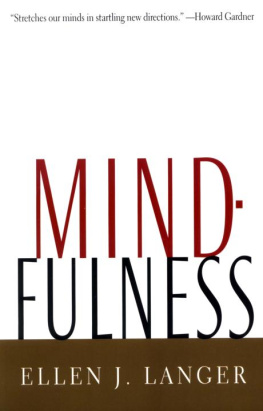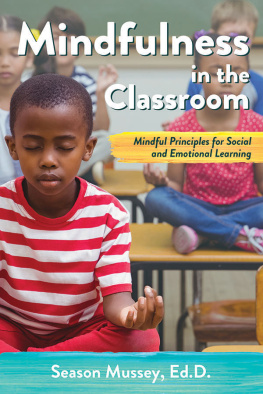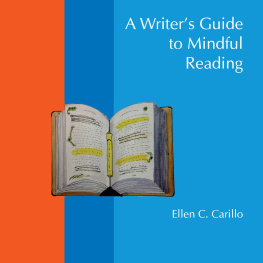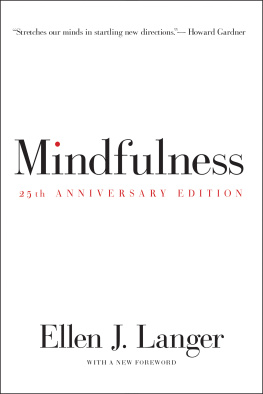Praise for The Power of Mindful Learning
The Power of Mindful Learning argues that traditional methods of learning can produce mindless behavior because they tend to get people to overlearn a fact or a task and suggest that there is only one way to do it. She argues that it is important to teach skills and facts conditionally, setting the stage for doubt and an awareness that different situations may call for different approaches or answers.... Landmark studies make the point scientifically.
The New York Times
Im a firm believer in the power of mindful learning. This book should be required reading for teachers at every level, both in academia and the business world.
Howard Stevenson, Harvard Business School
Like Freud, Piaget, Werner, and Vygotsky, Langer is well on her way to constructing a grand theory of human functioning with important implications for such diverse areas as education and learning, development and aging, group relations, and psycho- and neuro-pathology.... Never before has social psychology provided more subtle insights into neuropsychology and related fields than in Langers provocative work.... Her seemingly simple experimental manipulations point out profound truths about the human condition and how we as people can develop.
Contemporary Psychology
Praise for Ellen Langer
Ellen Langers insights span every field of human endeavor, including not least my own.
Atul Gawande, MD, Harvard Medical School, author of Complications,
All of us who write books about psychology for a popular audience are aware that we stand on the shoulders of giants, and Ellen Langer is one of those giants.
Malcolm Gladwell, author of Blink
No one in the history of psychology has done more than Ellen Langer in showing the power mindfulness can give us over our health and happiness.
Philip Zimbardo, Stanford University, author of Shyness
Dr. Ellen Langer has always been a source of great inspiration to me. With elegant simplicity, she can completely change your life and transform your experience of reality.
Deepak Chopra, MD


Copyright 1997, 2016 by Ellen J. Langer, PhD
All rights reserved. No part of this publication may be reproduced, stored in a retrieval system, or transmitted, in any form or by any means, electronic, mechanical, photocopying, recording, or otherwise, without the prior written permission of the publisher. Printed in the United States of America. For information, address Da Capo Press, 44 Farnsworth Street, Third Floor, Boston, MA 02210.
Set in 10-Point Caslon by the Perseus Books Group
Library of Congress Cataloging-in-Publication Data
Names: Langer, Ellen J., 1947
Title: The power of mindful learning / Ellen J. Langer; with a new introduction by the author.
Description: Boston, MA: Da Capo Lifelong Books, 2016. | Series: A Merloyd Lawrence book | Includes bibliographical references and index.
Identifiers: LCCN 2015044939 | ISBN 9780738219097 (e-book)
Subjects: LCSH: Learning. | Attention. | Thought and thinking. | Cognition. | BISAC: PSYCHOLOGY / Creative Ability. | PSYCHOLOGY / Personality. | PSYCHOLOGY / Cognitive Psychology.
Classification: LCC LB1060 .L35 2016 | DDC 370.15/23--dc23 LC record available at http://lccn.loc.gov/2015044939
Published as a Merloyd Lawrence Book by Da Capo Press
A Member of the Perseus Books Group
www.dacapopress.com
Da Capo Press books are available at special discounts for bulk purchases in the U.S. by corporations, institutions, and other organizations. For more information, please contact the Special Markets Department at the Perseus Books Group, 2300 Chestnut Street, Suite 200, Philadelphia, PA 19103, or call (800) 810-4145, ext. 5000, or e-mail .
10 9 8 7 6 5 4 3 2 1
Permissions
Excerpt from The Little Prince by Antoine de Saint-Exupery, copyright 1943 and renewed 1971 by Harcourt Brace and Company is reprinted with the kind permission of Harcourt Brace and Company.
Excerpt adapted from Series 7 exam is reprinted with the kind permission of Todd Rosenfeld.
Excerpt from Primer Class in Elizabeth Bishop, The Collected Prose copyright 1984 by Alice Methfessel is reprinted with the kind permission of Farrar, Straus and Giroux, Inc.
Lines from Robert Frost, Two Tramps in Mud Time in The Poetry of Robert Frost edited by Edward Connery Lathem, copyright 1936 by Robert Frost, 1964 by Leslie Ballantine Frost, and 1969 by Henry Holt and Company are reprinted with the kind permission of Henry Holt and Company, Inc.
Lines from Psalms by Luis Llorns Torres quoted in The Whole World Book of Quotations copyright by Ross Petras and Kathryn Petras are reprinted with the kind permission of Addison-Wesley Publishing Company.
Excerpts from The Three Languages, Hansel and Gretel, The Four Artful Brothers, and The Old Man and His Grandson in The Complete Fairy Tales of the Brothers Grimm, translated by Jack Zipes and copyright 1987 by Jack Zipes, are reprinted with the kind permission of Bantam Books, a division of Bantam Doubleday Dell Publishing Group, Inc.
Excerpts from The Lost Horse and The Kings Favorite in Chinese Fairy Tales and Fantasies, translated by Moss Roberts, and copyright 1979 by Moss Roberts are reprinted with the kind permission of Pantheon Books, a division of Random House.
Contents
E ach chapter of this book relies in part on the mindfulness of various students with whom Ive had the pleasure of working. Their contributions are noted throughout where our experiments are described. Even more extensive collaboration and thus special thanks are extended to Douglas DeMay and Paul Whitmore re chapter 1; to Mathew Lieberman re chapter 4; Becca Levy re chapter 5; and Justin Brown re our work on intelligence.
Taken as a whole, this book has benefited greatly from the comments and questions given to me by Roger Brown and Lenore Weitzman. Katherine Jaeger, Trina Soske, John Myers, Albert Carnasale, Marie Tatar, Phyllis Katz, and Nancy Hemenway also provided useful insights. I extend my gratitude to each for their advice and my appreciation of their friendship.
I also want to thank Sophia Snow and Brian Ericcson for their mindful technical help.
Last, but foremost, I am indebted to my editor and friend, Merloyd Lawrence, whose skill, patience, and wisdom helped me with each draft.

W hen I first wrote The Power of Mindful Learning, I strongly suspected what lay at the source of all kinds of mindlessnesspersonal, interpersonal, and societalbut hesitated to state it boldly. Now after more than forty years of research on the mindlessness of ostensibly thoughtful action, Im finally persuaded enough to state its cause in print.
Our schools are the problem. They unintentionally teach us to be mindless.
Schools do this in at least two ways. They teach us to evaluate each other and ourselves, and they teach us to seek or accept information as if it were absolute and independent of human creation. Both of these ideas were implicit in Mindfulness but not fully explained.
EVALUATION
Shakespeare warned us against being judgmental when he wrote Things are neither good nor bad but thinking makes it so. I would add that behavior makes sense from the actors perspective or else s/he wouldnt have done it. When we evaluate someone negativelyhes lazy, stubborn, gulliblewere evaluating the person from our observers perspective. It doesnt even occur to us that the person may instead be insufficiently motivated, steadfast, or trusting.
Next page







